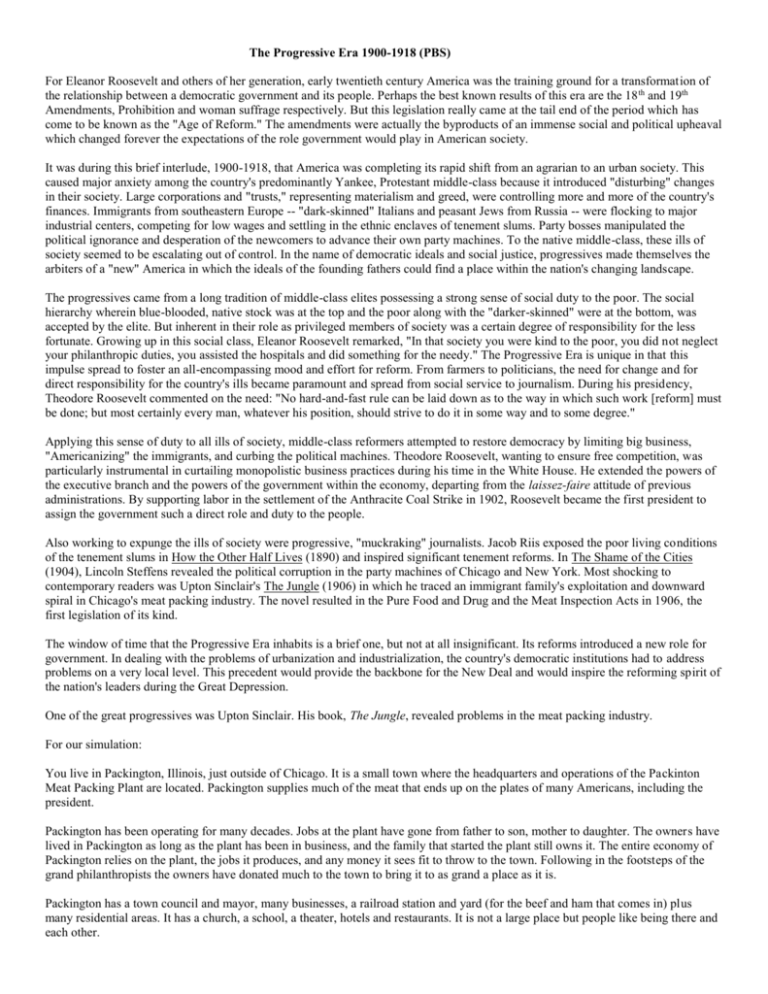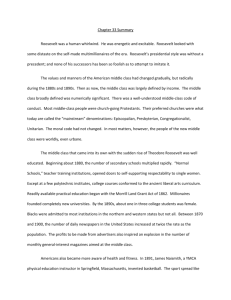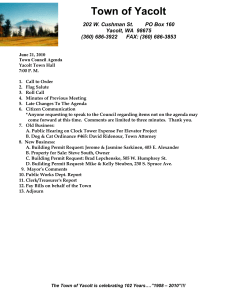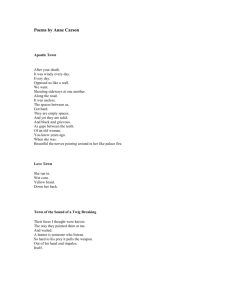The Progressive Era 1900-1918 (PBS)
advertisement

The Progressive Era 1900-1918 (PBS) For Eleanor Roosevelt and others of her generation, early twentieth century America was the training ground for a transformation of the relationship between a democratic government and its people. Perhaps the best known results of this era are the 18 th and 19th Amendments, Prohibition and woman suffrage respectively. But this legislation really came at the tail end of the period which has come to be known as the "Age of Reform." The amendments were actually the byproducts of an immense social and political upheaval which changed forever the expectations of the role government would play in American society. It was during this brief interlude, 1900-1918, that America was completing its rapid shift from an agrarian to an urban society. This caused major anxiety among the country's predominantly Yankee, Protestant middle-class because it introduced "disturbing" changes in their society. Large corporations and "trusts," representing materialism and greed, were controlling more and more of the country's finances. Immigrants from southeastern Europe -- "dark-skinned" Italians and peasant Jews from Russia -- were flocking to major industrial centers, competing for low wages and settling in the ethnic enclaves of tenement slums. Party bosses manipulated the political ignorance and desperation of the newcomers to advance their own party machines. To the native middle-class, these ills of society seemed to be escalating out of control. In the name of democratic ideals and social justice, progressives made themselves the arbiters of a "new" America in which the ideals of the founding fathers could find a place within the nation's changing landscape. The progressives came from a long tradition of middle-class elites possessing a strong sense of social duty to the poor. The social hierarchy wherein blue-blooded, native stock was at the top and the poor along with the "darker-skinned" were at the bottom, was accepted by the elite. But inherent in their role as privileged members of society was a certain degree of responsibility for the less fortunate. Growing up in this social class, Eleanor Roosevelt remarked, "In that society you were kind to the poor, you did not neglect your philanthropic duties, you assisted the hospitals and did something for the needy." The Progressive Era is unique in that this impulse spread to foster an all-encompassing mood and effort for reform. From farmers to politicians, the need for change and for direct responsibility for the country's ills became paramount and spread from social service to journalism. During his presidency, Theodore Roosevelt commented on the need: "No hard-and-fast rule can be laid down as to the way in which such work [reform] must be done; but most certainly every man, whatever his position, should strive to do it in some way and to some degree." Applying this sense of duty to all ills of society, middle-class reformers attempted to restore democracy by limiting big business, "Americanizing" the immigrants, and curbing the political machines. Theodore Roosevelt, wanting to ensure free competition, was particularly instrumental in curtailing monopolistic business practices during his time in the White House. He extended the powers of the executive branch and the powers of the government within the economy, departing from the laissez-faire attitude of previous administrations. By supporting labor in the settlement of the Anthracite Coal Strike in 1902, Roosevelt became the first president to assign the government such a direct role and duty to the people. Also working to expunge the ills of society were progressive, "muckraking" journalists. Jacob Riis exposed the poor living conditions of the tenement slums in How the Other Half Lives (1890) and inspired significant tenement reforms. In The Shame of the Cities (1904), Lincoln Steffens revealed the political corruption in the party machines of Chicago and New York. Most shocking to contemporary readers was Upton Sinclair's The Jungle (1906) in which he traced an immigrant family's exploitation and downward spiral in Chicago's meat packing industry. The novel resulted in the Pure Food and Drug and the Meat Inspection Acts in 1906, the first legislation of its kind. The window of time that the Progressive Era inhabits is a brief one, but not at all insignificant. Its reforms introduced a new role for government. In dealing with the problems of urbanization and industrialization, the country's democratic institutions had to address problems on a very local level. This precedent would provide the backbone for the New Deal and would inspire the reforming spirit of the nation's leaders during the Great Depression. One of the great progressives was Upton Sinclair. His book, The Jungle, revealed problems in the meat packing industry. For our simulation: You live in Packington, Illinois, just outside of Chicago. It is a small town where the headquarters and operations of the Packinton Meat Packing Plant are located. Packington supplies much of the meat that ends up on the plates of many Americans, including the president. Packington has been operating for many decades. Jobs at the plant have gone from father to son, mother to daughter. The owners have lived in Packington as long as the plant has been in business, and the family that started the plant still owns it. The entire economy of Packington relies on the plant, the jobs it produces, and any money it sees fit to throw to the town. Following in the footsteps of the grand philanthropists the owners have donated much to the town to bring it to as grand a place as it is. Packington has a town council and mayor, many businesses, a railroad station and yard (for the beef and ham that comes in) plus many residential areas. It has a church, a school, a theater, hotels and restaurants. It is not a large place but people like being there and each other. Sinclair’s The Jungle has just been published and copies of the book have made there way to Packington. You, like most of the town, have read the passage that seems to be most condemning and worrisome. No one has every spoken about the meat packing industry this way and the workers have never said that anything like the passage in the book goes on. The town council and mayor are under pressure to respond to the passage. They have decided to hold a town council meeting on Thursday to decide what to do. They have two days to meet, Thursday and Friday. They know that not just the town will be watching what they do as nationally printed newspaper and magazine writers will be in town, and representatives of the federal government. TR has taken a big interest in the issue and what you decide to do. Each of you will represent a member of Packington. You will have to talk and act as they would have in 1906 [I have put on line excerpts of what was going on in 1906]. You may take any action you want regarding the article. The council will be doing something that must be completed by Friday. The roles (arbitrarily handed out): City Councilman (women did not vote yet or hold office in our town) 5 The mayor 1 Loyal aid to the mayor 1 Owners of the plant 2 A local progressive 1 A well known national progressive 1 Workers in the plant 5 Parents who work in Packington but not at the plant 4 Others who work in Packington 5 Business owners, including a local butcher 3 Restaurant owner 1 A representative of Teddy Roosevelt 1 A muckraking journalist 1 Some senior citizens who do not like all this nonsense that is going on. 2 Wealthy members of the community 2 Packington’s doctor 1 You may not switch roles, unless I agree. You may not work with friends unless that is how the roles end up. You may make the roles your own by doing additional research. Our week will go as follows: Day 1: handout roles, prep the class, get going Day 2: decide what to do, build alliances, take actions Day 3: election day for some on the council/council prepares for its meeting/others prepare for meeting Day 4: first day of council meeting Day 5 final day for council/mayor’s decision/town vote? Or other action? Be aware that the key roles must be here all week (you are very good on attendance). You might want to focus on chapter 28 and the progressive movement. Neither the president, nor Congress, nor any state has taken an action yet. You are the first to do so. You can use two newly created reforms: the initiative/proposition process (think Prop 19) and/or the recall process (think Governor Schwarzenegger’s first election to become governor). Other questions?







